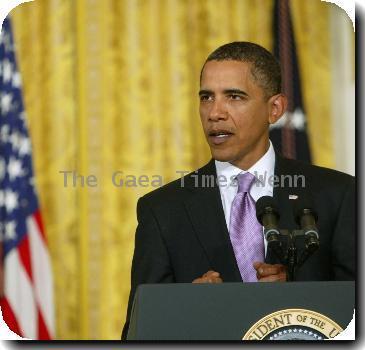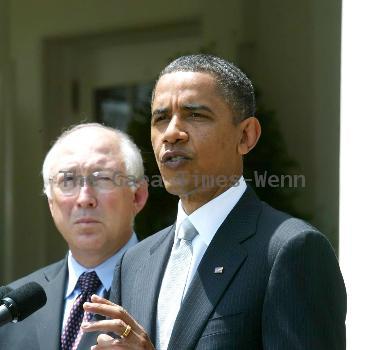Obama, Clinton, speaking to AIDS conference by video, pledge US support for AIDS fight
By APFriday, July 23, 2010
Obama, Clinton pledge US support for AIDS fight
VIENNA — President Barack Obama and Secretary of State Hillary Rodham Clinton have pledged the support of the United States in the global fight against AIDS.
Speaking Friday via prerecorded video at the close of an international conference dedicated to the disease, the two said they were committed to building upon progress and taking the lead in ensuring a sustainable and effective response.
“Ending this pandemic won’t be easy, and it won’t happen overnight,” Obama told delegates gathered in the Austrian capital. “But thanks to you, we’ve come a long way — and the United States is committed to continuing that progress.”
Clinton said the United States believes access to HIV/AIDS prevention, treatment and care should be a universal and shared responsibility and said health was a human right.
“As we push to expand access to these resources, the United States will continue to work with our partner countries and with civil society to help empower citizens to lead the charge in their own countries,” she said.
Washington will host the next international AIDS conference in July 2012.
During this week’s meeting, the more than 19,000 delegates heard promising news about a vaginal gel spiked with the AIDS drug tenofir that has proved capable of blocking the AIDS virus.
They also welcomed an announcement by the World Health Organization that a record 5.2 million people were receiving lifesaving AIDS drugs last year, up from 4 million in 2008.
But the gathering was overshadowed by woes about replenishing the Global Fund to Fight AIDS, Tuberculosis and Malaria, which provides major support for AIDS programs around the world.
Donors meet in October to decide on the fund’s financing level for the next three years amid concerns that a desired $20 billion in pledges won’t be reached.
While some protesters directly targeted the United States, a recent U.N. report showed that the U.S. was the largest donor of international AIDS assistance in 2009, accounting for more than 58 percent of disbursements by governments.
Conference chief Julio Montaner of the International AIDS Society said in his closing remarks that the United States has what it takes to make a difference and thanked Obama for his leadership in changing policies that infringe upon human rights.
“The U.S. has the power to literally change the course of the epidemic,” Montaner said.
Nobel peace laureate Desmond Tutu of South Africa, meanwhile, stressed that HIV prevention, treatment, care and support are a human rights priority.
“To deny treatment is to deny life itself,” Tutu said in a video address.
Over the course of the week, activists have slammed the rich G-8 countries for failing to deliver on a commitment to ensure that everyone infected with HIV and AIDS gets treatment by 2010.
In 2005, G-8 leaders committed to developing and implementing an Africa-focused package for HIV prevention, treatment and care with the aim of getting “as close as possible to universal access to treatment for all those who need it by 2010.” They reaffirmed and broadened their commitment a year later.
But a G-8 accountability report from last month’s summit of world leaders in Canada acknowledged that the “universal access targets with respect to HIV/AIDS will not be met by 2010.”
Earlier Friday, the U.N.’s top investigator on torture and punishment warned delegates that overcrowded prisons are breeding grounds for AIDS.
Often, inmates are held in inhumane conditions in which the HIV virus is spread through the use of non-sterile drug injection equipment, sexual contacts, tattooing and sharing of razors, Manfred Nowak said.
_____
Online:
AIDS conference: www.aids2010.org/
Tags: Austria, Barack Obama, Correctional Systems, Diseases And Conditions, Eastern Europe, Epidemics, Europe, Infectious Diseases, North America, Pandemics, Public Health, Summits, Ukraine, United States, Vienna, Western Europe



